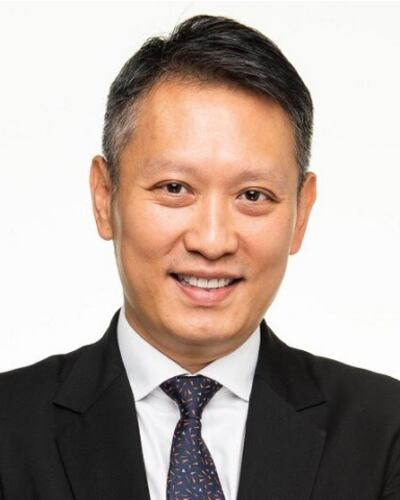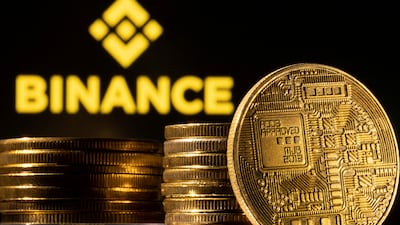Binance, the world’s largest cryptocurrency exchange, will adopt a phased approach to launching products and services in the UAE to pre-qualified investors and professional financial service providers, a senior representative said.
The exchange obtained a virtual asset licence to operate in Dubai this month after the emirate outlined clear regulations to govern emerging technology sectors such as cryptocurrencies in an effort to safeguard investors.
“We will cater our offerings to sophisticated and accredited investors, subject to the Virtual Asset Regulatory Authority’s [Vara] approval,” Richard Teng, regional head of Middle East and North Africa at Binance, said.
“We will extend our products and target clientele as and when the Vara is comfortable with our offerings.”

Binance was founded in China in 2017 and has its headquarters in the Cayman Islands and Seychelles. The exchange has faced increased regulatory scrutiny in the US, UK, Europe and China and has taken steps to improve its relationship with regulators.
Binance has also sought to expand its presence in the Middle East as it seeks to cash in on the region's interest in cryptocurrencies.
This month, Dubai became the first in the region to adopt a law to regulate virtual assets in an effort to provide investors a safe environment while embracing emerging technologies as interest in them grows.
Vara serves as the single custodial entity mandated to licence and govern the cryptocurrency sector in Dubai, including all mainland and free zones, excluding the DIFC.
The Dubai Financial Services Authority, the regulator of the emirate’s financial free zone, also published its regulatory framework overseeing crypto tokens, or cryptocurrencies, for public consultation. The proposed regulations aim to protect investors and apply to companies interested in marketing, issuing, trading or creating crypto tokens in or from the Dubai International Finance Centre.
“We perform KYC [know your customer] for all customers, while few other cryptocurrency exchanges do it. We follow global and local standards in anti-money laundering, KYC and counter-terrorism financing. We follow the same standards as other financial institutions,” Mr Teng said.
regional head of Middle East and North Africa at Binance
Cryptocurrency is a technology that, like the internet, will continue to evolve. But human beings have a tendency to box things into what they are familiar with without recognising it is new, said Mr Teng, who was previously chief executive of Abu Dhabi Global Markets.
“Regulators in the past tended to look at cryptocurrencies as securities or commodities. In some jurisdictions, you have the central bank and securities regulator disagreeing on how to regulate this asset class.
“The Vara is very innovative since it recognises cryptocurrencies as a totally different asset class. It helps manage risks and protect consumers in the financial system as well as supporting innovation and blockchain deployment.”
In December, Binance signed a preliminary agreement with the Dubai World Trade Centre Authority to develop an industry hub for global virtual assets in the emirate.
“We invest a lot in blockchain and are the largest cryptocurrency and blockchain infrastructure provider globally. We are creating a hub in Dubai to enable us to deploy and develop innovative blockchain products to support the wider blockchain ecosystem,” Mr Teng said.
Binance also won regulatory approval from the Central Bank of Bahrain this month to operate as a cryptoasset service provider in the kingdom.
“We procure licences in jurisdictions where it is available and makes commercial sense to us. Today, only one-third of global regulators regulate cryptocurrencies,” he said.
“Many jurisdictions in the Mena region do not have crypto regulatory frameworks in place. We are looking forward to working very closely with policymakers and regulatory agencies to help them develop a regulatory framework that understands the unique characteristics of the crypto industry.”
Cryptocurrency adoption today accounts for only 4 per cent to 5 per cent of the global population, while less than 1 per cent of global wealth is invested into this asset class, according to Binance.
“We are at a very early phase of crypto adoption. Regulators need to come up with a framework, and investor awareness needs to increase,” Mr Teng said.
In addition to its Binance Academy — which provides investors with information on cryptocurrencies and blockchain — the exchange is also working with governments and educational institutions to bring about more awareness, the executive said.
Replying to a question on volatility in the industry, Mr Teng said cryptocurrencies have been far less volatile than the stock market in the past three months.
“Cryptocurrency is a $2 trillion to $3tn market today. When the market cap reaches $50tn, I can assure you that the volatility will be less than what you see today. With faster adoption, a bigger market cap and the entry of institutional investors and family offices, volatility will reduce.”
"The narrative today is that cryptocurrency is a high-risk industry where money laundering is a concern. But if you do a deep dive, the way the industry performs anti-money laundering and transaction monitoring is much better [when] compared with other sectors," Mr Teng said.
The traceability in this space is also much stronger than in the traditional space, he added.
“Do your own research and don’t rely on what celebrities promote. Also, do not trust unlicensed operators and avoid investing in projects that you are not aware of,” he told investors.


